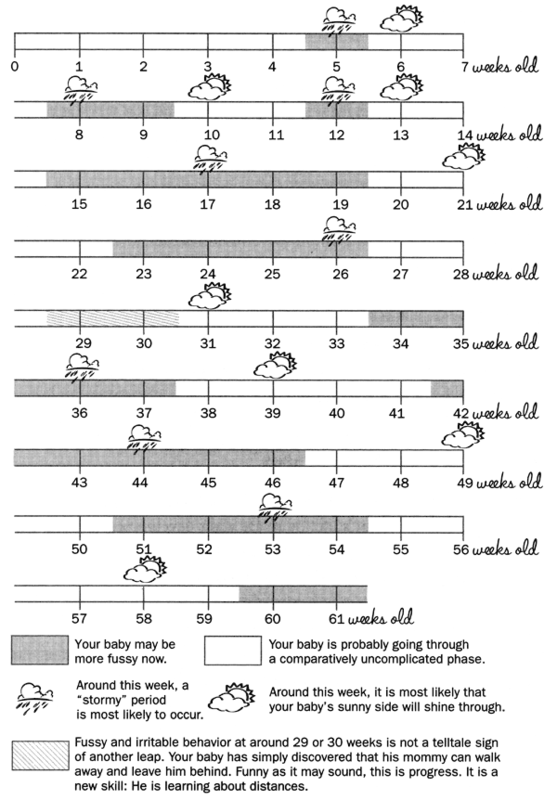The journey of parenthood is filled with countless milestones, and one of the most fascinating aspects is the concept of "wonder weeks." These developmental phases represent periods when babies experience significant growth, both mentally and physically. During these times, you may notice changes in your child's behavior, mood, and overall development. Understanding these wonder weeks can help you navigate the ups and downs of parenting while better supporting your little one's growth.
Wonder weeks are based on the research of Dutch pediatrician Dr. Frans Plooij and his partner, developmental psychologist Dr. Hetty van de Rijt. They observed that infants go through specific mental leaps, which often coincide with their growth spurts. This phenomenon offers insights into why your baby might seem extra fussy or clingy during these periods. By recognizing these developmental milestones, parents can anticipate changes and better respond to their child's needs.
As you venture through the wonder weeks with your baby, it's important to remember that each child develops at their own pace. While some children may experience these leaps more intensely than others, the key is to provide a supportive environment that fosters their growth. With this understanding, you can better appreciate the beauty and complexity of your baby's development journey.
What Are Wonder Weeks?
Wonder weeks refer to specific periods in a baby's first 20 months of life when they undergo significant cognitive and emotional development. During these weeks, babies may demonstrate increased fussiness, clinginess, or changes in sleep patterns. These phases are often marked by mental leaps that enable babies to learn new skills and understand their surroundings on a deeper level.
How Many Wonder Weeks Exist?
In total, there are 10 wonder weeks that occur during the first 20 months of a baby's life. These weeks are spaced out and coincide with various developmental milestones. The wonder weeks are as follows:
- Week 5: The World of Changing Sensations
- Week 8: The World of Patterns
- Week 12: The World of Smooth Transitions
- Week 19: The World of Events
- Week 26: The World of Relationships
- Week 37: The World of Categories
- Week 46: The World of Sequences
- Week 55: The World of Programs
- Week 64: The World of Principles
- Week 75: The World of Systems
When Do Wonder Weeks Occur?
Wonder weeks typically occur during specific weeks of your baby's life. For instance, the first wonder week usually happens around week 5, with subsequent weeks following a predictable pattern. However, it is essential to remember that these timeframes can vary from child to child. Some babies may experience wonder weeks earlier or later than others, depending on their individual development.
How Can Parents Support Their Babies During Wonder Weeks?
Supporting your baby during wonder weeks involves being attentive to their needs and providing a nurturing environment. Here are some tips for parents:
- Be patient: Understand that your baby may be more fussy than usual during these periods.
- Offer comfort: Hold, cuddle, and soothe your baby to help them feel secure.
- Engage in play: Use age-appropriate toys and activities to stimulate your baby's mind.
- Establish routines: Consistent routines can help provide a sense of security during uncertain times.
What Are the Signs of a Wonder Week?
During wonder weeks, parents may notice various signs indicating that their baby is experiencing a mental leap. Some common signs include:
- Increased clinginess or desire for attention
- Changes in sleep patterns, such as waking more frequently at night
- Heightened fussiness or irritability
- New skills or behaviors emerging, such as rolling over or babbling
How Can I Track My Baby's Wonder Weeks?
There are several ways to track your baby's wonder weeks:
- Use a wonder weeks app: Many apps are available that provide a calendar of wonder weeks and insights into each leap.
- Keep a journal: Document your baby's behavior, milestones, and any changes you notice during wonder weeks.
- Consult resources: Books and websites dedicated to child development can provide valuable information about wonder weeks.
What Happens After Wonder Weeks?
After each wonder week, babies often emerge with new skills and a deeper understanding of their environment. This period of growth can be exciting as you witness your child develop and thrive. While the wonder weeks can be challenging for both parents and babies, they ultimately pave the way for significant developmental progress.
How to Prepare for Future Wonder Weeks?
As you become familiar with the concept of wonder weeks, you can better prepare for future phases by:
- Educating yourself: Continue to learn about child development and the significance of wonder weeks.
- Connecting with other parents: Share experiences and insights with other parents who may be navigating similar challenges.
- Creating a supportive environment: Foster an environment that encourages exploration and learning, allowing your child to thrive.
Conclusion: Embracing the Wonder Weeks Journey
The wonder weeks can be both a challenging and rewarding experience for parents and babies alike. By understanding the significance of these developmental leaps, you can better support your child's growth while navigating the ups and downs of parenthood. Remember that each child is unique, and the wonder weeks are just one aspect of their incredible journey of development. Embrace this time, and cherish the milestones as your little one grows and learns.
You Might Also Like
Delicious Discoveries: The Allure Of Boneless Wings**The Joyful Rhythms Of Boogie Woogie: A Dance Through Time**
Indulge In The Sweetness Of Iced Caramel Macchiato
Unveiling The Glamour: The Life And Legacy Of Bebe Zahara Benet
Discovering The Thrill Of HollywoodBets: Your Ultimate Guide
Article Recommendations
- Terry Reynolds
- What Really Happened To Bob Saget
- Themoviesflix
- Taylor Heinicke Girlfriend
- Muni Long Husband
- Olivia Casta
- Jessica Alba Husband
- 50 Shades Actor
- Back To December
- Masa49


